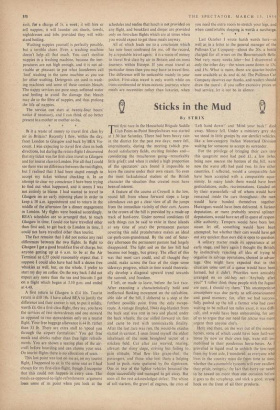Sticks in the Mud
By STR1X THE first race in the Household Brigade Saddle Club Point-to-Point Steeplechases was started at 1.30 last Saturday. There had been heavy rain in the district for the past two days; more fell, intermittently, during the meeting (which pro- duced satisfactory fields, exciting finishes and— considering the treacherous going—remarkably little grief); and when it ended a high proportion of the spectators' cars found it impossible to leave the course under their own steani. To even the most lackadaisical student of the British character the situation thus created must have been of interest.
A feature of the course at Crowell is the low, round hill from whose forward slope a large attendance can get a clear view of all the jumps from the immediate vicinity of their cars. Access to the crown of the hill is provided by a made-up track of hard-core. Under normal conditions (if such things can be said to exist in these islands at any time of year) the permanent pasture covering this mild protuberance makes an ideal car-park-cum-grandstand. By the end of Satur- day afternoon the permanent pastUre had largely disappeared. The light soil on the low hill had become not boggy, but greasy. The effect of this was that most cars could, and all thought they could, make across the face of the, slope some Sideways progress, which in time would theoretic- ally develop a diagonal upward trend towards the summit, and freedom.
I left, or made to leave, before the last race. After executing a characteristically bold and ineffectual flanking movement on the unfashion- able side of the hill, I slithered to a stop at the furthest possible point from the only escape- route. A vintage (Imphal, 1944) dog-blanket from the back seat was rent in two and placed under the back wheels; the car sidled forward six feet and came to rest with unmistakable finality. After the last race was run, the would-be exodus started in earnest. I soon found myself the oldest inhabitant of the most benighted sector of a stricken field. Car after car weaved, roaring, athwart the slimy slope, striving hut failing to gain altitude. Mud flew like grape-shot; the passengers, and those who lent them a helping hand to push,-were spattered by the slipstream. One or two of the lighter vehicles brea'sted the slope successfully and managed to get away. But soon all the rest acknowledged defeat. The whine of self-starters, the growl of engines, the cries of `Left hand down !' and 'Mind your back !' die( away. Silence fell. Under a minatory grey sky we stood in little groups by our derelict vehicles like a low-category Italian Motorised Division waiting for someone to accept its surrender.
For the privilege of bringing their cars ink this quagmire most had paid £1, a few Wm being now nearest the bottom of the hill, wen now the worst off) had paid two. In few othei countries, I reflected, , would a comparable falL have been accepted with a comparable equa nimity. In many lands there would have beer gesticulations, oaths, recriminations. Goaded or by -their womenfolk—all of whom would .hav( remained inside the cars throughout—the mer would have banded themselves together Harangues would have been delivered. A furiow deputation, or more probably several splinter deputations, would have set off in quest of respon- sible authority. Tempers would have been lost. steam let off, something would have been attempted; but whether their cars would have got out any quicker than ours did is open to question.
A solitary tractor made its appearance at an early stage, and here again I thought the British. by instinctively rejecting all idea of trying to organise its salvage operations, showed to advan. tage. One might have expected that in this situation some sort of a queue would have been formed, but it didn't. Priorities were amicably arranged on an old-boy net—`Anybody after you?' 1 rather think those people with the Jaguar are next. I shOuld try them.' This uncompetitive atmosphere was due partly to self-consciousness and good manners; for, after we had success, fully pushed up the hill a farmer who had cows waiting to be milked ten miles away, it was diffi- cult, and would 'have been unbecoming, for any of us to argue that our need for rescue was more urgent than anyone else's.
Here and there, on the way out of the morasst horses, some of which could have been half-wayi home by now on their own legs, were still im. mobilised in their ponderous horse-boxes. As grovelled in liquid mud to unhitch the tow-rope from my front axle, I wondered, as everyone wild 1 lives in the country must do from time to time;: whether the automobile tycoons will ever swallovi their pride, reCognis.: the fact that every car needs. to be towed on more than one occasion before it goes to the scrapheap, and stick a good, strong hook on the front of all their products.


















































 Previous page
Previous page